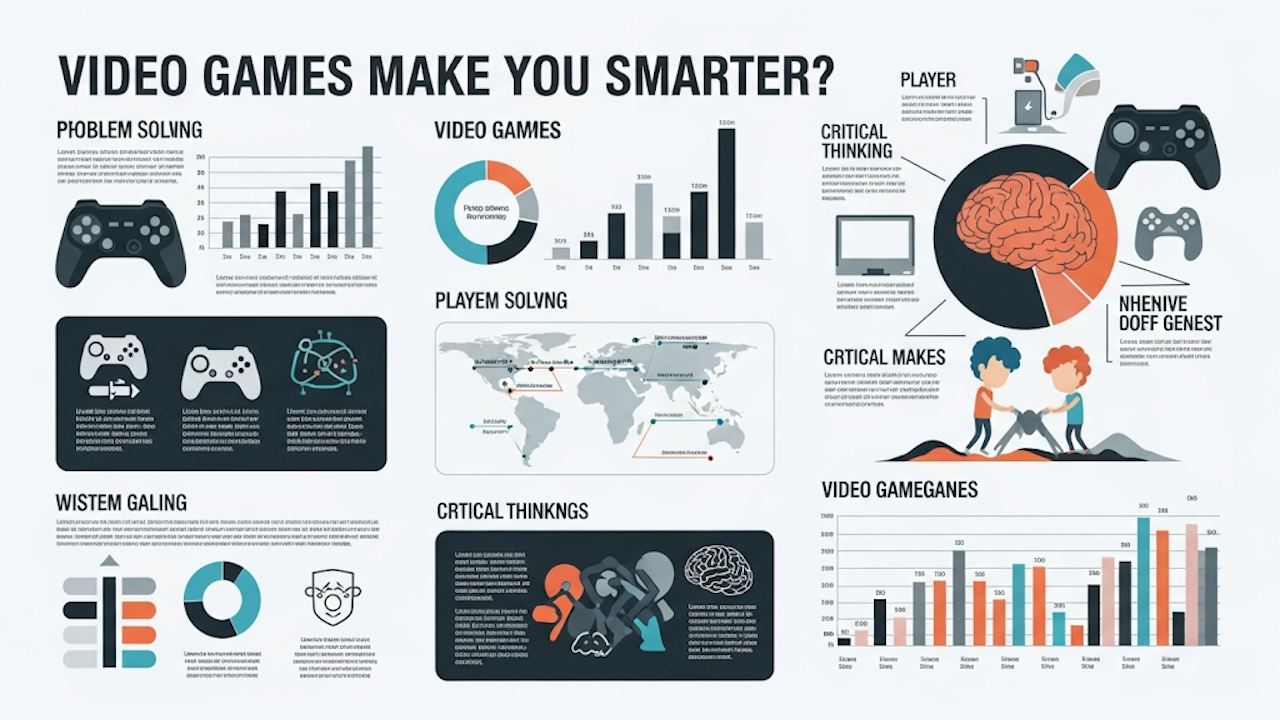For decades, video games have faced criticism for promoting laziness, violence, and social isolation. However, in recent years, a growing body of scientific research has challenged these stereotypes. Instead of merely being a form of mindless entertainment, some studies suggest that playing video games can actually improve cognitive functions and make players smarter in specific ways. But how strong is the evidence, and what exactly does “smarter” mean in this context?
Defining Intelligence in the Context of Gaming
Before diving into the science, it’s important to define what we mean by “smarter.” Intelligence is a broad and multifaceted concept. It includes everything from memory and problem-solving ability to emotional understanding and spatial awareness. So, when scientists study the impact of video games, they typically focus on specific cognitive skills such as attention span, working memory, decision-making, and spatial reasoning.
Improved Cognitive Skills Through Gaming
Numerous studies have shown that video games, particularly action and puzzle games, can enhance several key areas of cognitive functioning:
1. Attention and Focus
Fast-paced games often require players to track multiple objects, switch attention quickly, and respond to visual stimuli with precision. Research published in journals like Nature and Psychological Science has demonstrated that gamers tend to have better selective and sustained attention than non-gamers. In one study, individuals who played action games regularly were better at detecting changes in a cluttered environment and had enhanced visual attention span.
2. Problem Solving and Strategic Thinking
Many games involve complex narratives, puzzles, and strategic decision-making. Role-playing games (RPGs), for instance, often require players to manage resources, plan long-term goals, and adapt to new information. Studies have linked these types of gameplay to improvements in problem-solving skills and higher scores in related academic tasks.
3. Spatial Reasoning and Navigation
First-person shooters and 3D platformers are known to improve spatial awareness. This includes the ability to mentally rotate objects, navigate through environments, and understand spatial relationships. A study from the University of Toronto found that regular gamers performed better on spatial reasoning tasks compared to non-gamers, an ability that has practical applications in fields such as engineering and architecture.
4. Working Memory and Multitasking
Some video games challenge players to hold multiple objectives in mind, remember sequences, and switch between tasks quickly. These demands can strengthen working memory—the mental “scratchpad” we use to temporarily hold and manipulate information. Games like StarCraft and Overcooked push players to manage several dynamic elements simultaneously, a skill relevant in many real-world settings.
Brain Changes and Neuroplasticity
Beyond behavioral studies, neuroimaging has revealed structural and functional changes in the brains of gamers. MRI scans have shown increased grey matter in regions associated with memory, spatial navigation, and strategic planning. These physical changes reflect the brain’s ability to adapt and reorganize itself—what neuroscientists call neuroplasticity.
One notable study by researchers at the Max Planck Institute for Human Development found that participants who played the game Super Mario 64 for 30 minutes a day over two months experienced growth in the hippocampus and prefrontal cortex—areas tied to memory formation and complex cognitive behavior.
Educational and Therapeutic Applications
The potential cognitive benefits of video games are being harnessed in educational and therapeutic contexts. Educational games are increasingly used in classrooms to make learning more engaging and interactive. Meanwhile, certain games are being developed to help individuals with ADHD, autism, and dyslexia improve specific cognitive deficits.
One FDA-approved game, EndeavorRx, is designed specifically to help children with ADHD improve attention function. It is one of the first video games to be prescribed as a medical treatment, highlighting how far the concept of “smart gaming” has come.
The Caveats: Not All Games Are Equal
While the cognitive benefits are promising, not all games offer the same advantages. The effects largely depend on the type of game and the way it is played. Puzzle and strategy games are more likely to stimulate higher-order thinking, while casual or repetitive games may offer fewer cognitive benefits. Moreover, excessive gaming can lead to negative outcomes like addiction, poor academic performance, and social withdrawal if not balanced with other activities.
Time spent gaming also matters. A moderate amount of gameplay appears to be beneficial, but heavy, prolonged sessions may lead to diminishing returns or even negative effects on mental health and sleep quality.
Conclusion: A Nuanced Picture
So, do video games make you smarter? The answer is nuanced. While they may not boost IQ in the traditional sense, a growing body of research suggests that certain types of video games can enhance cognitive skills like attention, memory, problem-solving, and spatial reasoning. These improvements are especially evident in action, puzzle, and strategy games.
What’s clear is that the narrative around video games is evolving. No longer seen merely as a frivolous pastime, gaming is increasingly recognized as a medium with the potential to train the brain and support learning. Like any tool, the impact of video games depends on how they’re used. When chosen thoughtfully and played in moderation, video games can indeed be a smart way to have fun.

